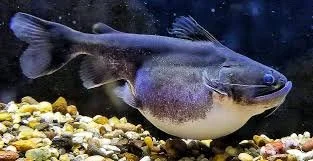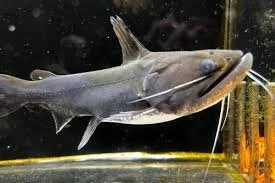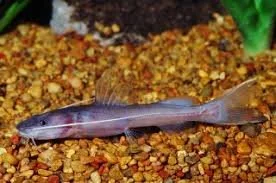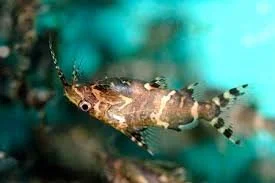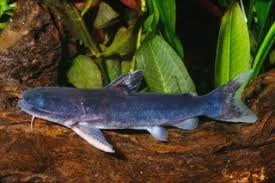 Image 1 of 1
Image 1 of 1


Catfish- Tocantins Pacman Large
The "catfish tocantins pacman fish" is likely a misinterpretation. The user may be conflating two different species: the
Pacman Catfish (Lophiosilurus alexandri) from the São Francisco River and the Giant Talking Catfish (Megalodoras irwini), which is a different species that can have a yellow/gold color morph from the Tocantins River. The Pacman Catfish is known for its huge mouth and ambush predator style, while the Giant Talking Catfish is a large, armored, and generally docile catfish.
Pacman Catfish (𝐿𝑜𝑝ℎ𝑖𝑜𝑠𝑖𝑙𝑢𝑟𝑢𝑠𝑎𝑙𝑒𝑥𝑎𝑛𝑑𝑟𝑖)
Appearance: Distinctive large, wide mouth and a depressed, broad body.
Habitat: Native to the São Francisco River basin in Brazil.
Behavior: A bottom-dwelling ambush predator that uses camouflage and a "sit-and-wait" strategy to catch prey.
Size: Can grow to about 72cm (2.36ft).
Giant Talking Catfish (𝑀𝑒𝑔𝑎𝑙𝑜𝑑𝑜𝑟𝑎𝑠𝑖𝑟𝑤𝑖𝑛𝑖)
Appearance: A heavily armored catfish.
Habitat: Found throughout the Amazon and its tributaries, including the Tocantins River.
Color Morph: Tocantins River specimens are known for a vivid yellow or gold color against a black background.
Behavior: Generally a peaceful, "gentle giant" in an aquarium setting that ignores most fish but requires a very large tank (180 gallons minimum) due to its potential adult size.
Diet: In the wild, it eats snails, crustaceans, fruit, and vegetation; in captivity, it accepts a wide variety of sinking foods and serves as a great scavenger.
How to determine which fish the user means
If the user is asking about a large, predatory fish with an extremely wide mouth, they are likely asking about the Pacman Catfish (𝐿.𝑎𝑙𝑒𝑥𝑎𝑛𝑑𝑟𝑖).
If the user is asking about a gold or yellow, armored, and generally peaceful fish from the Tocantins River, they are likely asking about the Giant Talking Catfish (𝑀.𝑖𝑟𝑤𝑖𝑛𝑖).
The "catfish tocantins pacman fish" is likely a misinterpretation. The user may be conflating two different species: the
Pacman Catfish (Lophiosilurus alexandri) from the São Francisco River and the Giant Talking Catfish (Megalodoras irwini), which is a different species that can have a yellow/gold color morph from the Tocantins River. The Pacman Catfish is known for its huge mouth and ambush predator style, while the Giant Talking Catfish is a large, armored, and generally docile catfish.
Pacman Catfish (𝐿𝑜𝑝ℎ𝑖𝑜𝑠𝑖𝑙𝑢𝑟𝑢𝑠𝑎𝑙𝑒𝑥𝑎𝑛𝑑𝑟𝑖)
Appearance: Distinctive large, wide mouth and a depressed, broad body.
Habitat: Native to the São Francisco River basin in Brazil.
Behavior: A bottom-dwelling ambush predator that uses camouflage and a "sit-and-wait" strategy to catch prey.
Size: Can grow to about 72cm (2.36ft).
Giant Talking Catfish (𝑀𝑒𝑔𝑎𝑙𝑜𝑑𝑜𝑟𝑎𝑠𝑖𝑟𝑤𝑖𝑛𝑖)
Appearance: A heavily armored catfish.
Habitat: Found throughout the Amazon and its tributaries, including the Tocantins River.
Color Morph: Tocantins River specimens are known for a vivid yellow or gold color against a black background.
Behavior: Generally a peaceful, "gentle giant" in an aquarium setting that ignores most fish but requires a very large tank (180 gallons minimum) due to its potential adult size.
Diet: In the wild, it eats snails, crustaceans, fruit, and vegetation; in captivity, it accepts a wide variety of sinking foods and serves as a great scavenger.
How to determine which fish the user means
If the user is asking about a large, predatory fish with an extremely wide mouth, they are likely asking about the Pacman Catfish (𝐿.𝑎𝑙𝑒𝑥𝑎𝑛𝑑𝑟𝑖).
If the user is asking about a gold or yellow, armored, and generally peaceful fish from the Tocantins River, they are likely asking about the Giant Talking Catfish (𝑀.𝑖𝑟𝑤𝑖𝑛𝑖).


